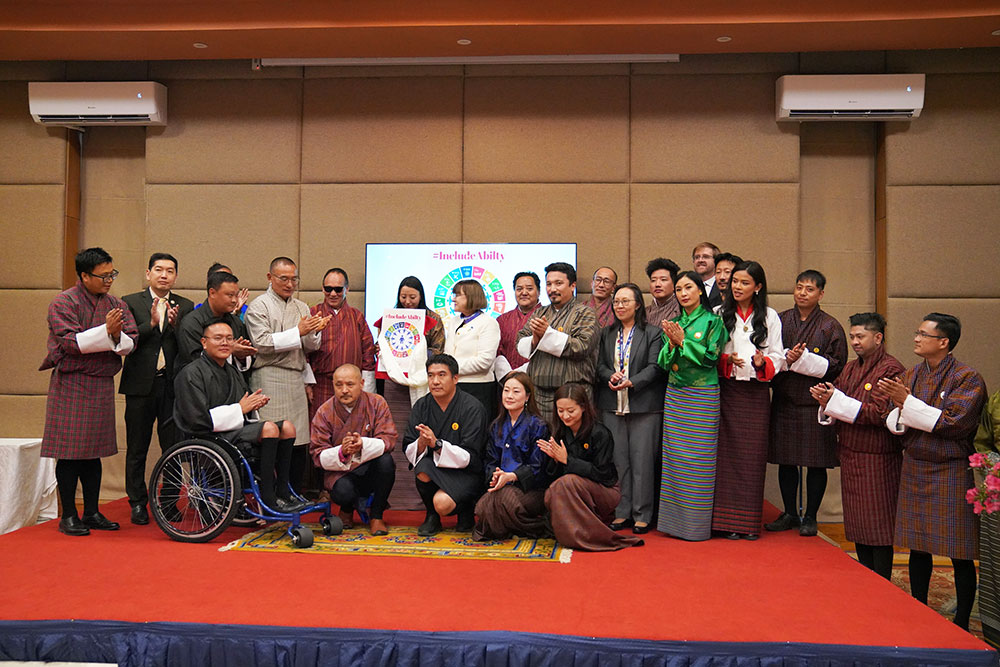
…25% of working journalists have less than one year’s experience
Streamlining communication channels and institutionalising media spokespersons will enhance transparency and accountability in Bhutan, according to the 22nd annual South Asia Press Freedom (SAPFR) 2023-2024 report launched by International Federation of Journalists (IFJ) yesterday.
Titled ‘Hollowed out media,’ the report stated that Bhutan’s press freedom faced a setback in 2023, with the country’s ranking plummeting from 33rd to 90th place in the World Press Freedom Index by Reporters Without Borders.
This year, the rank dropped to 147th scoring 37.29 percent of the 180 countries studied on political, economic, legislative, social, and security indicators.
Bhutan scored the lowest in the political indicator of the five indicators.
Citing the “small society syndrome” and fear of backlash, Bhutanese journalists heavily self-censor with 84 percent of journalists practicing it. To bolster media resilience and innovation, investments in professional development and technological infrastructure are essential, the report stated. “Collaborative efforts between government, media organisations, and civil society are crucial to navigating Bhutan’s media landscape towards greater autonomy and effectiveness.”
Globally, Norway stands first followed by Denmark in press freedom index while Eritrea followed by Syria stands 180th and 179th respectively.
Existing Challenges
The report states that Bhutanese journalism is characterized by relatively younger journalists with mixed experience and greater gender parity. The loss of experienced journalists impacts the production of in-depth stories and availability of mentors for young journalists, affecting public trust in the media.
The average age of journalists is 34 years. 25 percent have less than one year’s experience.
A survey conducted by the Centre for Bhutan and GNH Studies in 2023 found that of the 63 professionals surveyed, 32 had left the profession, while 31 stayed in the media. “The main reasons for leaving the profession were low salary and lack of professional development. Lack of access to information was also a common concern, with nearly two-thirds of respondents identifying this as the main,” as per the survey.
The report states that there is no systematic mechanism to facilitate access to information, leading to difficulties for journalists. Bhutan lacks a law ensuring the media’s right to access information. The Bhutan InfoComm and Media Authority (BICMA) regulates the media sector through the Information, Communication and Media Act of Bhutan 2018.
A study by the Bhutan Media Foundation (BMF) in 2023 also noted the difficulty where 84 percent of Bhutanese journalists reported various degrees of difficulty in obtaining information from bureaucracies.
On sustainability, the report stated that private media in Bhutan has survived on the back of government subsidies, which is being equally divided among all the private media houses regardless of their market share has prevented commensurate gains for the more efficient ones.
Moreover, the report highlighted the recent assurance of support by the government and its willingness to engage with the media as a beacon of hope for Bhutanese journalism.
Prime Minister Tshering Tobgay, during the third meet-the-press session, emphasized and discussed the pivotal role of the media in upholding democratic principles. He urged the media not to shy away from critiquing and engaging in debates over government policies to uphold an accountable government.
The report recommended media houses and the government encouraging innovation and fostering flexibility to evolve with changing trends and technology.
“Journalists in Bhutan should collaborate with international news agencies or global media houses to gain experience and increase earnings, necessitating an appropriate supportive regulatory framework,” it stated.












